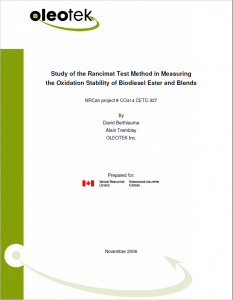Études Rancimat
Étude sur l’utilisation de la méthode Rancimat pour mesurer la stabilité oxydative de mélanges de biodiesel esters.
ABSTRACT
The writing of Canadian standards for biodiesel ester blends by the Canadian General Standards Board (CGSB) raises questions about the possibility of including a specification for the thermo-oxidative stability – or “oxidation stability” – of biodiesel blends. To help answer those questions, OLEOTEK has been mandated by NRCan to
develop a project with the following objectives:
1) To test biodiesels made from Canadian sources of oil – namely Canola oil, soybean oil, fish oil, yellow greases, and tallow – using the EN 14112 method in order to compare their oxidation stability with results obtained in USA and Europe;
2) To evaluate the influence of peroxide value (PV), acid value (AV), and feedstock source (fatty acid profile) on the oxidative stability (OSI IP) of different samples;
3) To study the possibility of developing a validated test method adapted from EN 14112 to test biodiesel blends.
Oxidative stability (OSI IP), peroxide value, and acid value were determined for 7 biodiesel samples made from different feedstock, 6 of which were of Canadian origin. Also, OSI IP measuring was attempted on biodiesel blends with petrodiesel and the effect of methanol content on OSI IP was determined. We reached the conclusion that the EN 14112 Rancimat) method is not suited for measuring oxidation stability of biodiesel blended with petroleum diesel. Also, no direct correlation was found between OSI IP and either PV or AV. Methanol content was shown to have no significant effect on OSI IP. Finally, compositional data lead us to conclude that the fatty acid distribution is not the major factor causing the OSI IP differences observed between similar samples of different origin.


